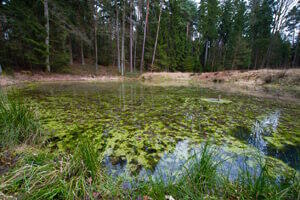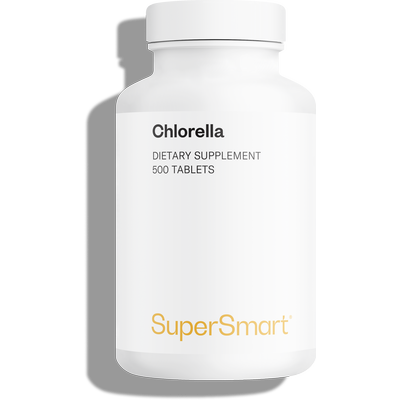18-08-2016
The superfood that swallows up mercury
 If you regularly eat fish and seafood, you might be interested in this simple strategy.
If you regularly eat fish and seafood, you might be interested in this simple strategy.
There is a well-known algae that can bind to mercury (and other heavy metals such as lead and cadmium).
It is called chlorella.
Chlorella is available (at low cost) in gelatine and vegetarian capsules. You can obviously also find organic forms.
When you’re eating fish or seafood and you’re worried about the increase in heavy metals your body is absorbing, you can quite simplytake a capsule of chlorella with, or at the end of your meal.
Even before they are absorbed by your intestines, the molecules of mercury and other heavy metals will bind to the chlorella directly in your stomach and you will eliminate them via the normal intestinal route.
It’s a simple, practical and inexpensive way of preventing rapid accumulation of heavy metals in your body. And it also avoids the need for actual ‘chelation’, which involves significant cost and adverse health effects (more about this later).
Why fish and sea food contain mercury
In aquatic environments, elemental mercury reacts to form a toxic, organic compound : methylmercury (MeHg). Present in low concentrations in sea water and sediments, methylmercury accumulates in the tissues of living organisms right across the food chain in a process called « bioaccumulation ». That is why it is found in predators at higher levels of the food chain - including most of the large fish consumed by humans: tuna, shark, pike and swordfish.
As for shellfish - mussels, oysters, scallops, lobster and crayfish, they constantly filter seawater and retain in their tissues some of the metals present in the sea - either naturally or as a result of pollution by humans.
This does not mean you should stop eating sea food. On the contrary, many studies have shown that despite heavy metals, sea food is still highly beneficial for the health, providing welcome proteins and omega-3s. Eating fish twice a week has, in particular, been shown to reduce the risk of depression in women by 25% [1].
But taking a simple chlorella capsule each time you eat a sea food meal will significantly lower your absorption of the heavy metals present in these foods.
Why you shouldn’t allow mercury to accumulate in your body
Mercury is a heavy metal which is harmful to the nervous system. When it enters the body (via the digestive tract or the skin), it gathers in adipose (fatty) tissue including, unfortunately, the brain which is made up of 80% fats.
It then exerts damaging effects, blocking enzymes and causing neurological problems. It is particularly dangerous for the developing brain of the fœtus and has recently been linked with hyperactivity [2].
It is a problem that is only going to get worse in the future given the increasing pollution in our seas and oceans.
At the same time, we must be careful (as always) to avoid catastrophising the issue. Many internet gurus totally exaggerate the severity, and especially the frequency, of mercury poisoning. These are usually the same people who will then recommend chelation treatments (to remove heavy metals) based on herbs and natural products, which are in reality ineffective at tackling this problem.
Genuine mercury poisoning is possible, and should be taken very seriously, but it is much rarer than we imagine. Because it is rare, it is also more difficult for doctors to diagnose - they tend to be concerned only when the poisoning is obvious, for example when a child breaks a mercury thermometer and puts it in his or her mouth or in the case of an industrial accident.
Chelation (heavy metal elimination) effective against cardiac disease
Nevertheless, it has now also been scientifically proved that chelation does result in health benefits, particularly against cardiac disease.
. At a conference organised by the American College of Cardiology in San Francisco, scientists presented the results of a study of 1700 subjects in which heavy metal chelation had improved the health of individuals who had already suffered a cardiovascular event. Lead author Dr Lamas told the conference “We brought something that has been an alternative medicine treatment into the realm of scientific inquiry and found unexpected results that may merit future research”.
However, such chelation treatments require the use of chemical molecules that can ‘grab’ the mercury from the fat cells where it is trapped, but in so doing, also eliminate nutrients. That is why chelation should always be accompanied by multivitamin and mineral supplementation.
In the above-mentioned study, only those participants who took multivitamins while undergoing chelation actually reduced their risk of a second cardiovascular event (by a significant 26 %) [3].
In any case, the ideal is to avoid this scenario.
If a person has actually been poisoned by mercury and his or her health is poor, the protocol of elimination, which suddenly "releases" and " circulates" a significant amount of mercury molecules which the body had patiently and cleverly " isolated", "enclosed "and rendered harmless ... can be dangerous..
That is why I do not recommend the ‘brute force’ approach of full « chelation » which will clean out all your heavy metals in a few days or weeks.
Remove your heavy metals gradually and gently
Our bodies have a natural molecule that can gradually eliminate mercury.
But it is a slow process, hampered by the constant arrival of new pollutants.
Hence the benefit in limiting your absorption of heavy metals whenever you can.
It is why I recommend that you regularly consume chlorella, an algae that can bind to the heavy metals in your diet and remove them from your body - gently. You therefore facilitate the gradual elimination of your excess metal stores.
The recommended amount of chlorella for optimal results is 4g, every time you eat fish or sea food.
Take care in choosing your chlorella
Make sure you know the origin of your chlorella since insofar as it attracts heavy metals and pollutants, it can be easily contaminated. Just as it cleanses our bodies, it also cleans the planet and should therefore only be grown and packaged according to the strictest standards of purity.
Ensure you buy your chlorella from a trusted supplier who will provide technical analysis data sheets guaranteeing the absence of pollutants.
Ask the company the following questions:
-
How often do you analyse the batches of chlorella?
Do you have certificates ensuring compliance with organic farming production methods?
Does the chlorella comes from a natural environment or from artificial ponds (these are easier to control)?
Does the producer check for heavy metal contamination?
It is grown in accordance with rigorous specifications established by the German Ministry of Agriculture and is certified organic.
The growing ponds are located in well-maintained areas far from urban, industrial and agricultural areas. The water used for cultivation is subject to constant analysis (pH, residues ...)
Each batch is tested before it is released for sale: it is analysed for chlorophyll, carotenoids, proteins, pesticides, heavy metals (lead, arsenic, mercury) and bacteria (staphylococcus, salmonella…).
Additional benefits
Chlorella’s beneficial effects are not limited to protection from heavy metals.
It is a plant of exceptional nutritional quality. After the last war, it was even believed that chlorella might solve some of the problems of overpopulation, but its production requires too much care and is thus too expensive for it to serve as a basic foodstuff
Chlorella contains 60% of proteins and all the essential amino acids, making it an excellent food for vegetarians. In addition, it is rich in B vitamins, GABA (for morale), folate, vitamin B12 and iron.
. Its health benefits are myriad. It may be effective against fibromyalgia, may slightly lower high blood pressure and may have a preventive effect against cancer, according to studies on animals.
Your very good health!
Jean-Marc Dupuis
This letter has been adapted from an article first published on santenatureinnovation.com with their permission
Sources :
[1] Smith K. longitudinal Associations Between Fish Consumption and Depression in Young Adults. Am. J. Epidemiol. (2014) doi: 10.1093/aje/kwu050 First published online: April 15, 2014
[2] Arch Pediatr Adolesc Med. 2012;():1-9.
[3] Lamas GA, et al. Randomized comparison of high-dose oral vitamins versus placebo in the Trial to Assess Chelation Therapy (TACT). ACC meeting 2013.
Order the nutrient mentioned in this article
© 1997-2026 Fondation pour le Libre Choix
All rights reserved
All rights reserved
Free
Thank you for visiting our site. Before you go
REGISTER WITHClub SuperSmart
And take advantage
of exclusive benefits:
of exclusive benefits:
- Free: our weekly science-based newsletter "Nutranews"
- Special offers for club members only















